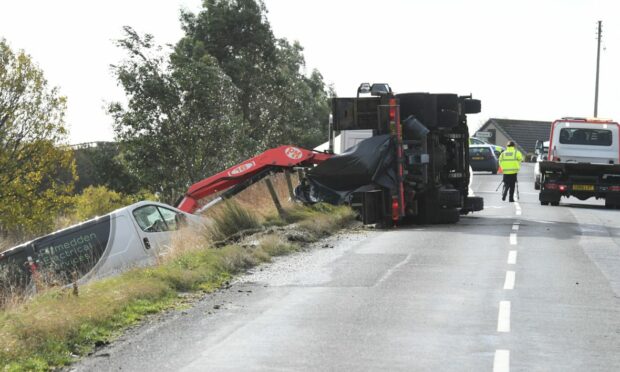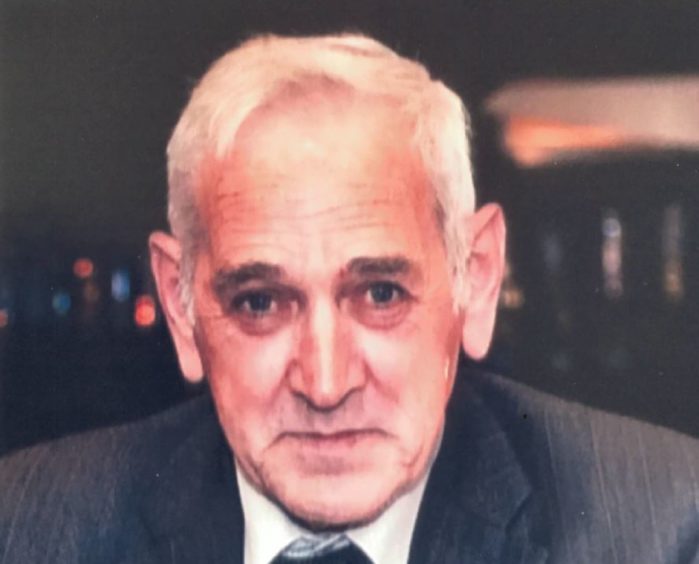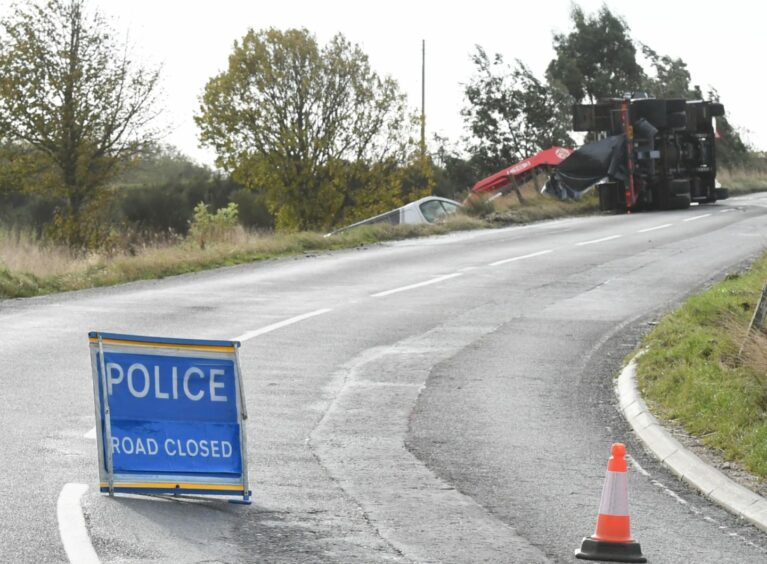A vehicle recovery firm has admitted health and safety failings uncovered following the death of a worker, who was crushed when his truck fell on top of him.
While the breaches were discovered during a Health and Safety Executive (HSE) investigation into the death of Robert Garvock, they were not the cause of the devastating incident that killed him.
A Fatal Accident Inquiry (FAI) will now be held to investigate the 68-year-old dad-of-three’s death, which happened while he worked for Kairdson Tyres Limited.
The Ellon-based firm had been called to the scene to collect a van, which had been crashed down an embankment off the B999 Pitmedden to Potterton road by a drink-driver.
Fiscal depute Kristina Kelly told Aberdeen Sheriff Court: “At around 3am on October 27 2018 the Police Scotland Dundee area control room contacted the vehicle recovery scheme to instruct the forensic recovery of Nissan Primaster van which was on its side down an embankment on the B999.
“The vehicle had been reported stolen.
‘Very significant risk of destabilising the lorry’
“Forensic recovery was necessary to assist with the identification of the driver, and moreover the vehicle was suspected to contain valuable tools.
“Kairdson Tyres were allocated to the task under the vehicle recovery scheme and Mr Garvock was the on-call vehicle recovery operator for them that night.”
However, during the lift, the recovery lorry toppled over, crushing Mr Garvock beneath the cab.
The cause of his death was said to be “traumatic asphyxia”, consistent with the cab of the lorry having fallen on top of him as he stood on the roadside.
He died at the scene.
Sheriff Mark Stewart KC said: “This breach of the act is one which was discovered in the course of the investigation carried out by the HSE following the fatal accident on October 27 2018 which led to the death of Mr Garvock.
“The failings which were uncovered did not cause the death of Mr Garvock.
“It’s very important that it’s understood that his court is dealing with this breach of the act and reaching a conclusion as to the appropriate disposal and is not seeking to place any measure on the life of Mr Garvock or the worth of his efforts on behalf of the company or the loss suffered by his family.
“This court is dealing with more technical matters relating to procedures and the failures in procedures, but these procedures themselves did not cause the death.”
Sheriff Stewart KC went on: “The primary cause of the accident, as I understand it, was the failure to fully extend the near-side stabiliser prior to and during the lift operation.
“That, coupled with the nature of the operation, created an instability which allowed the vehicle to overturn and fatally injure Mr Garvock.
“The failures in the charge were detected in the subsequent investigation, but it’s clearly accepted these were not what caused the accident in question.”
The sheriff said an FAI would follow and would explore the cause of the accident.
Issues were ‘not picked up’
In relation to the breaches before the court, he ordered the company to pay a fine of £9,800.
Kairdson Tyres Ltd admitted a charge under the Health and Safety at Work etc Act 1974.
The charge stated Kairdson Tyres failed to ensure, so far as is reasonably practicable, the health, safety and welfare at work of its employees.
Three specific failings were highlighted:
- Failing to provide employees with an anemometer (a wind measuring device) which is essential for safe use of the hydraulic crane on the vehicle recovery lorry.
- Failing to ensure a suitable and sufficient risk assessment was carried out and in place for the task of lifting the van with the vehicle recovery lorry.
- Failing to provide employees carrying out vehicle recovery work with such information, instruction and training and supervision in relation to the carrying out of such work as was necessary to ensure, so far as was reasonably practicable, the health and safety at work of the employees.
The charge stated the failings meant Mr Garvock was exposed to the risk of serious injury or death.
Aberdeen Sheriff Court heard Mr Garvock was given “industry-approved” training by an “externally accredited expert” when he joined the company.
However, a number of things were not included in this training, which the court heard meant he was “not adequately trained as a competent person, or appointed person, for lifting operations and so there was not a safe system of work in place whereby lifting operations would only be carried out further to a plan prepared by an operator trained in planning lifting operations”.
‘Company immediately suspended lifting operations’
Ms Kelly said: “Although there was no written lift plan in place for the specific task, the evidence is that Mr Garvock had appropriate training in relation to understanding the very significant risk caused by not fully extending and securing both stabilisers prior to beginning the lift.
“In particular lifting the recovered van over the nearside of the lorry without the nearside stabilisers being extended created a very significant risk of destabilising the lorry regardless of how windy it was.”
While risk assessments and planning were carried out, the company accepted it did not expect employees to formally record their lift planning in writing.
Kairdson Tyres, which sells tyres, repairs cars, carries out MOTs and offers van hire and vehicle recovery services, swiftly implemented improvements in the wake of the incident.
Ms Kelly told the court: “In addition, the company immediately suspended lifting operations and took the vehicle involved in the incident off the road.
“After a period of reflection, the company decided, notwithstanding the changes introduced, that they would no longer accept instructions to undertake recoveries which involve lifting operations.”
Defence agent Mark Donaldson said Kairdson Tyres was annually audited and the health and safety issues were “not picked up”.
He added it had been operating and recovering vehicle for many years “without incident”.
For all the latest court cases in Aberdeen as well as crime and breaking incidents, join our Facebook group.


